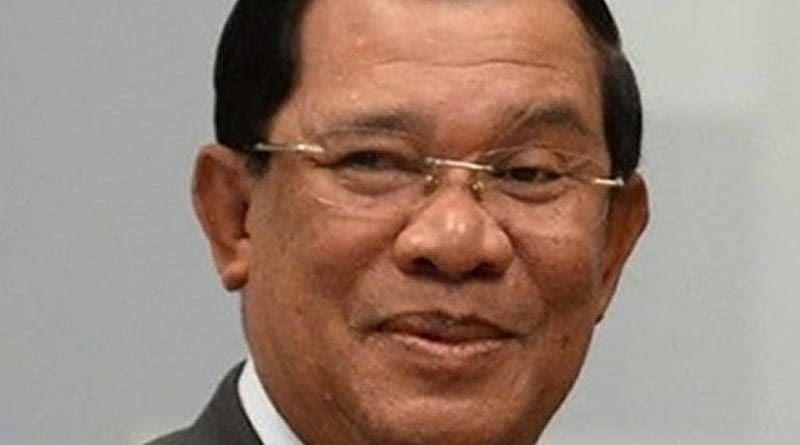Cambodia: Hun Sen’s Son Set For Electoral Success – Analysis
By Sokvy Rim
The Cambodian People’s Party (CPP) achieved a landslide victory in the commune elections in June 2022, gaining 80 per cent of the 11,622 commune council positions. Yet there is speculation that Cambodian Premier Hun Sen is unlikely to stand as the prime ministerial candidate in the 2028 national election.
That much became clear on 2 December 2021 when Hun Sen declared support for his oldest son, Hun Manet, to be the next prime ministerial candidate for the CPP. Supportive posts from CPP members swamped Hun Manet’s Facebook profile after the announcement, but the absence of congratulatory messages from Sar Kheng, a senior CPP member, led to speculation that some senior party members did not favour the new candidate. While there may be a little friction within the party, it is unlikely to pose a challenge to the CPP’s potential new leader.
Hun Manet’s rise to key positions within the party suggests that Hun Sen has sufficient support to overrule any opposition to his son’s candidacy within the CPP. In late 2018, Hun Manet became a member of the CPP’s permanent committee consisting of thirty of the CPP’s most powerful members. He was appointed head of the Party’s 1.5 million member strong Youth Movement in June 2020. He was then elevated to deputy head of the CPP’s Mass Movement section in December 2020 — engage with the Cambodian people.
The main motive behind Hun Manet’s various promotions was to garner support for his candidacy from the youth and general Cambodian population. Hun Manet’s steady rise through the ranks strongly suggests there is a consensus among the majority of senior CPP members regarding the party’s next potential leader. Hun Sen’s final goal should be to secure support for Hun Manet from the United States and other Western countries — and recent changes to Cambodia’s foreign policy approach show that this goal is being taken seriously by Phnom Penh.
Prior to 2022, Cambodia had taken its relationship with the United States and other Western countries rather lightly. In 2017 Cambodia cancelled its bilateral military exercise with the United States, known as the Angkor Sentinel, due to domestic issues and anti-drug campaigns. The cancellation of the military drills marked a significant low point in Cambodia–US relations.
Worse still, in 2020 Cambodia rejected the United States’ offer to refurbish the Ream Naval Base and instead demolished the building and modernised it with Chinese support. The possibility of a Chinese military presence in Cambodia has since become a major issue in Cambodia–US relations.
Cambodia changed course in 2022 by becoming the ASEAN chair. The position is advantageous for Phnom Penh as it demonstrates its neutral approach to foreign affairs. On the first day of the US–ASEAN Special Summit on 12 May 2022, Hun Sen arrived in the United States and had a meeting with over 2000 Cambodians in Washington to reiterate Cambodia’s neutrality. The Cambodian government released its third Defence White Paper the following day, emphasising its independence by stating it would not allow foreign troops to be stationed on its soil.
Phnom Penh’s actions aim to address the United States’ concern about the possibility of a Chinese military presence in Cambodia, and to express Cambodia’s desire to improve its relationship with the United States. Kao Kim Hourn, Cambodia’s minister delegate attached to the prime minister, stressed that ‘[the Cambodian government was] pushing very hard’ to strengthen Cambodia–US relations.
Cambodia’s new foreign policy approach to the United States can be explained by Hun Sen’s desire to make the international environment less challenging for his successor, whose statecraft in leading the country is yet to be tested. US–China relations will have significant implications for Cambodia’s new leader and its foreign policy. Putting Cambodia in a position of neutrality between China and the United States will become pertinent as the rivalry becomes more tense.
Establishing stable foreign relations is vital for the CPP power transition to be successful. Though Hun Manet has significant support from Cambodian citizens and within the CPP, it is critical that he gains approval from the international community.
Without support from the United States and Western countries, the transition of power from Hun Sen to Hun Manet could generate a new wave of international condemnation, putting Cambodia on a dangerous path in the context of the escalating US–China rivalry.
*About the author: Sokvy Rim is Co-founder of The Thinker Cambodia, a digital commentary forum on foreign affairs. Follow him on Twitter @RSokvy.
Source: This article was published by East Asia Forum

